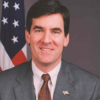Mitchell Reiss

Mitchell Reiss
Mitchell B. Reissis a senior American diplomat who is now the President and CEO of the Colonial Williamsburg Foundation in Virginia. Immediately prior to this post, he served a tenure of four years as the 27th president of Washington College in Chestertown, Maryland. He served as Director of Policy Planning at the United States Department of State under Colin Powell. He also served as the United States Special Envoy for Northern Ireland, with the diplomatic rank of Ambassador, until stepping...
NationalityAmerican
ProfessionDiplomat
CountryUnited States of America
We need to do a lot more thinking about how the regime is going to evolve, how the bad guys are going to adapt their tactics, and what measures we're going to need in order to go forward.
So, in a sense, the verification piece is irrelevant to the format issue.
No political party, and certainly no responsible political leadership, deserves to serve in a government unless it cooperates and supports fully and unconditionally the police, and calls on its supporters to do so.
What we can do is to explain as clearly as possible what the benefits would be of him going down one path, and what the potential consequences would be if he chooses another path.
We are hopeful that the North Koreans can show a little bit more realism, a little bit more flexibility.
It is fundamentally, existentially, in their own interest that they and their neighbors do not acquire nuclear weapons.
What Libya did was make a strategic determination that it would have a better future-a more secure, a more prosperous future-if it abandoned its weapons of mass destruction.
We have a model that we're following, and it's the Libya model.
I'm not sure you can do anything quickly or easily with the North.
The negotiations didn't end when the six parties left Beijing.
The negotiations are continuing now through the media.
Again, I think we have much greater diplomatic weight by having all of us sit on the same side of the table wanting the same thing, and putting it to the North Koreans.
I think all of us are pretty disappointed with the abdication of responsibility by many unionist leaders, ... No political party, and certainly no responsible political leadership, deserves to serve in a government unless it cooperates and supports fully and unconditionally the police, and calls on its supporters to do so.
It's time for the IRA to go out of business.